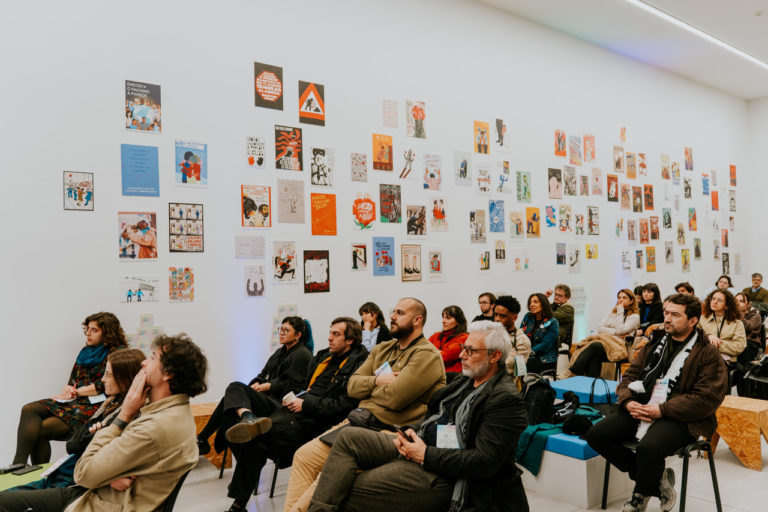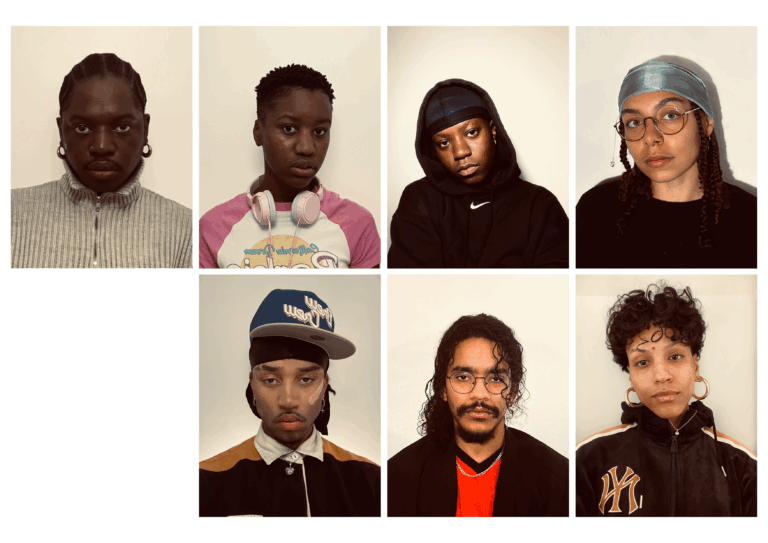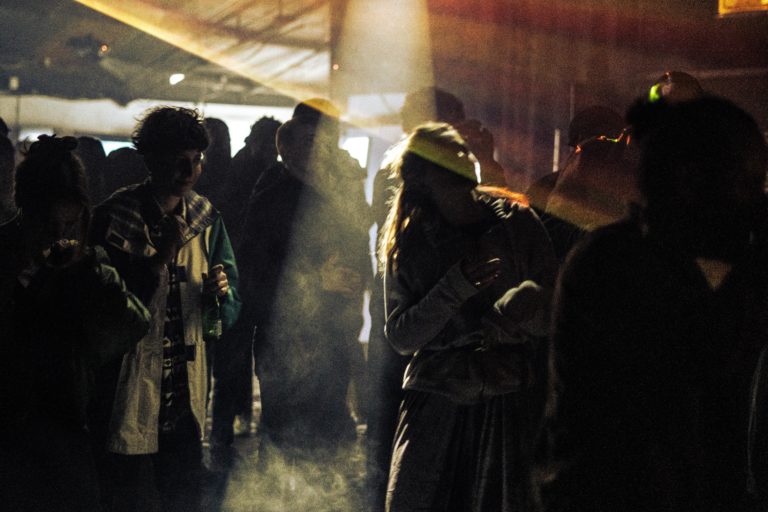Author: Manon Moulin
Lisbon’s once-thriving independent cultural scene is being pushed to the margins as gentrification reshapes Portugal’s urban and social landscape. Rising rents, State-sponsored real estate speculation, as well as bureaucratic and police pressures are forcing grassroots venues and collectives to close their doors, silencing alternative voices and erasing community spaces. From the closure of Lisbon’s queer safe space Planeta Manas to the ongoing struggles of artist-run hubs like Arroz Estúdios, independent culture finds itself in a battle against this neoliberal model that prioritises profit over people and culture.

Uncover, the festival to see beyond the image. Guimarães, March 2025 – © Mariana Silva
On July 25th, 2025, Planeta Manas, Lisbon’s first queer safe space run by the mina and Rádio Quântica collectives held its last event. After operating mostly voluntarily for four years, the space was forced to close due to multiple police raids, mounting costs, and bureaucratic issues such as licensing problems and noise complaints. This depressing closure is not an isolated case in Portugal and is a clear representation of the chaotic gentrification plaguing the country.
A State-Sponsored Gentrification
Gentrification processes are at work throughout Europe and the rest of the world. Most cities are being gentrified, which means that their historically working-class neighbourhoods are being priced out by richer classes and capitalist investments. This forces locals to move out of their family homes, which are then replaced by short-term, tourist-oriented apartments or new businesses. This phenomenon is accompanied by rising rents and real estate developments that aim to transform city centres, resulting in the homogenisation of European cities and the erasure of their traditional cultural and architectural characteristics.
In Portugal, the process of gentrification has been heavily State-sponsored over the last decade. Since the 2010s, several legal frameworks have been implemented to encourage corporate investment, both local and international, through programmes such as the Golden Visa scheme. The latter aimed to grant residency permits to foreign investors, for example those investing at least €500k in Portuguese capital funds. The Golden Visa scheme has been accompanied by tax programmes inciting real estate speculation, destroying the housing balance and leading to a situation where some districts in Lisbon now have more than 20% of housing stock dedicated to short-term rental (e.g. Alfama).
This uneven distribution puts locals in a difficult position, exacerbated by soaring rents. Between 2014 and 2024, house prices in Lisbon rose by 176%. Although Lisbon is marketed as a desirable place to live, it is now the least affordable city in Europe when it comes to price to income ratio, ahead of London and Paris.
This doesn’t only apply to Lisbon. Porto has also undergone gentrification, with the central and local authorities favouring investors over the local communities. Even less urban areas on the Algarve coast and in the countryside are starting to feel the capitalist property pressure, as explained by Sofia Craveiro, journalist at Gerador.
The first victims of this neoliberal mechanism are, of course, working-class long-term residents, leaving them in an even more precarious situation. They are also racialised people who are gradually being pushed out of city centres. In Lisbon, “greatest housing challenges were concentrated in self-built neighbourhoods on boroughs such as Amadora, Loures, Sintra, Odivelas, Almada or Setúbal, which are primarily inhabited by African and Afrodescendant communities from the PALOP (Portuguese-speaking African countries),” explains Jesualdo Lopes, founding curator at The Blacker the Berry (TBTB). Within the cultural sector, it is also the most vulnerable who are being pushed away or shut down: independent and grassroots initiatives.

Rare Effect, Arroz Estúdios. November 8th, 2024 – © Filipa Aurélio
Independent Culture at Risk, Local Communities Cornered
It has become increasingly difficult to be an independent venue and event organiser in Portugal. This is partly because the Portuguese State has historically overlooked culture, as Jesualdo Lopes explains. Figures speak for themselves: in 2020, less than 1% of the State budget was allocated to the Ministry of Culture, and in 2025 the proposal was just 0.45%. By prioritising commercial offerings and real estate developments, the Portuguese State, in Lisbon in particular, is actively “transforming neighbourhoods into tourism-oriented zones,” says Sofia Craveiro. This is accelerating the commodification of housing, public space, and culture. As a result, local communities are slowly losing their spaces, either because they or the cultural spaces are being forced out of their premises. This has serious social and political implications. Indeed, “erasing alternative ways of living, creating, and imagining the city affects democratic and civic participation,” says Sofia Craveiro. Where will artists practise their art when there are no more spaces in the city? Where will the local community experience music and art when all the cultural spaces are shut down?
As the process of gentrification is the result of national (Golden Visa, tax schemes), but also of local efforts, Arroz Estúdios, which is located in the Xabregas district of Lisbon, is a prime example of this gradual cultural loss. Although the venue is still open, it is facing eviction and has now entered a “programming break due to economic and licensing pressure,” according to Steven MacKay, co-founder and current president of the venue. He highlights the challenges faced by Portuguese venues, which are subject to noise complaints from newly developed residences and restrictions on opening hours imposed by the authorities. These restrictions affect the viability of running a venue, which must consider the need to raise staff salaries—they themselves are forced to live “further and further outside the capital due to the increasing rent costs”—while maintaining affordable prices for the community.
Pressure is also constantly felt by collectives such as The Blacker The Berry, which suffers from a lack of spaces in which to host events—either because venues are closing or because those that remain open have to change the way they work. This situation has forced TBTB to reduce the number of events they hold in Lisbon, as they are now facing “the introduction of rental fees, and, in some cases, the requirement of minimum financial guarantees to justify the use of the space.” Jesualdo Lopes also mentions the impact of “anonymous complaints” which put themselves and other arts collectives such as Coletivo Gira or Kizomba Na Rua, as well as their audiences in “constant fear and tension,” forcing them to cancel events and leaving people without a safe space.
“Gentrification is not just an urban issue; it’s a democratic one. It silences dissent, homogenises culture, and excludes those who cannot afford to belong,” says Sofia Craveiro. Jesualdo Lopes agrees, adding that “it also deepened social inequalities across the metropolitan area and the access to the centre.” Like many independent organisations, Planeta Manas was a significant space for queer, feminist, racialised, and marginalised communities. In less than a year, they experienced five violent police raids. On multiple occasions, the officers entered the premises without identifying themselves or presenting a warrant. They illegally searched people and the premises, destroying equipment in the process. Despite providing all the information and documentation requested, Planeta Manas continued to be targeted by the police, who disregarded their artistic freedom. Independent and alternative initiatives like this one are usually the first to suffer repression—and indeed, other commercial venues set up around them have not been targeted by the police. “This reflects a broader issue of institutional resistance to grassroots cultural expression,” explains Sofia Craveiro. The case of Planeta Manas is interesting, too, as they were receiving funding from official institutions such as DGArtes (Portugal’s Arts Council). This shows that no one is truly safe. “If funded projects can be targeted, imagine what could happen to small, self-sustaining, community-based collective like ours,” says Jesualdo Lopes, adding that “Planeta Manas’ closure was undoubtedly one of the saddest moments in Lisbon’s contemporary cultural scene.”
A similar situation occurred in Porto in 2023, when the Centro Comercial STOP!, a historical building from the 1980s housing artists’ studios and stores, was facing eviction. The artists were subjected to police raids and could only retrieve their musical instruments and artistic equipment under police escort. Meanwhile, a real estate development project was being realised on the same street… Double standards.
However, thanks to thorough mobilisation by the artists, they managed to regain the right to their studios and eventually resisted the gentrified, neoliberal status quo.

The Blacker The Berry Crew
Alternatives Possibilities
This phenomenon has impacted many different cultural organisations, prompting the emergence of movements to raise awareness and make their voice heard. Steven MacKay mentions Colectividades em Luta, for example. They organise marches and carry out valuable activist work with the Lisbon municipality. Many other movements are also fighting daily against unfair tax and legal frameworks, as well as against real estate developments that destroy historic housing buildings and their local communities and culture. Movimento Vida Justa “has played a crucial role in addressing these issues intersectionally, linking the housing crisis to police brutality and the hardships faced by racialised and migrant communities,” explains Jesualdo Lopes. Through regular mobilisation, the movement succeeds in creating solidarity dynamics and a new safe space for people suffering from aggressive urban and social policies. Other examples include Casa para Viver or Movimento Referendo pela Habitação.
Finding alternatives to combat gentrification involves professional solidarity. Gerador has experienced pressure from “rising rents and the scarcity of affordable workspaces.” Thanks to the Goethe-Institut Portugal, they have been provided with a workspace. Such arrangements are usually short or medium term, which speaks volumes about the precarious situation of independent media in Portugal. Nevertheless, it is “invaluable and has allowed us to continue our work without interruption,” points out Sofia Craveiro.
Jesualdo, Sofia, and Steven all emphasise the urgent need for political recognition and action to control gentrification. They suggest various ideas for change, such as recognising cultural spaces as essential infrastructure for social balance, providing public-supported spaces to independent collectives, offering tax incentives to landlords who rent to artists or cultural collectives, repurposing vacant buildings for cultural use, and prioritising pre-existing venues over residential development to avoid disputes over noise complaints. Steven MacKay even highlights the need to deal with the paradox of Lisbon’s Zone A: the “only zone where 24-hour licences are permitted”, yet where Porto Lisboa, the main owner of most of the zone’s buildings, “has a blanket ban on dancefloors in its rental contracts,” effectively excluding cultural venues.

Arroz Estúdios — © Marina Mole
Independent cultural organisations face an uphill struggle in resisting the status quo defended by the authorities, who should be acting to support their territory’s cultural initiatives. “Artistic freedom depends on spatial freedom,” says Sofia Craveiro. “When spaces vanish, artists lose the physical and symbolic ground on which to create freely, and neighbourhoods lose their soul.” Municipalities have all the information; now, there is a need to open a discussion with those most affected: the local communities and the players in the independent culture and media sectors.
References
Europe: Property Prices Index by City 2025
Agustín Cocola-Gant, “How Lisbon put itself on the map for real estate and tourism – and became Europe’s least affordable city,” The Guardian, June 25th, 2025
Planeta Manas is coming to a last orbit.
Hattie Lindert, “'We carry no regrets': Lisbon's Planeta Manas to close after police raids,” Resident Advisor, Avril 23rd, 2025
On the Police Invasion of Planeta Manas on 8 February
Ana da Cunha, “Lisbon Has A Plan To Fight Gentrification And Mass Tourism: Bring Back The Locals!,” Worldcrunch, May 23rd, 2024
Rúben Tiago Pereira, “sem chão para criar,” Expresso, April 11th, 2024
Mariana Vargas, “Silencing the Beat: Portuguese Iconic Music Hub “STOP” Faces Closure,” An Injustice!, July 24th, 2023
Rúben Tiago Pereira, “Baixa de Lisboa: liquidação total,” Expresso, July 13th, 2023
Miguel Lorga, João Fragoso Januário, and Carlos Oliveira Cruz, “Housing Affordability, Public Policy and Economic Dynamics: An Analysis of the City of Lisbon,” Journal of Risk and Financial Management, November 2022
Richard Matoušek, “Real estate speculation has made Lisbon one of the world’s most unlivable cities,” Blog de Mediapart, September 4th, 2022
Article 90-A – Residence Permit for investment purposes
Urban Lease Law – Rights and Duties
Published on September 18th, 2025
About the author:
Manon Moulin is the editorial coordinator of all European projects for the non-profit organisation Arty Farty. She specifically works on the European network of independent cultural and media organisations Reset!.